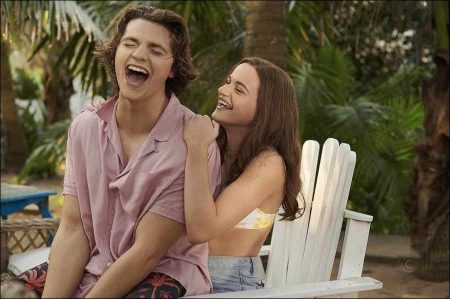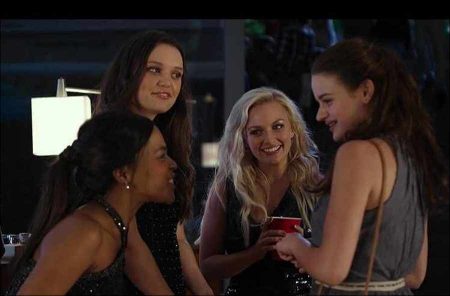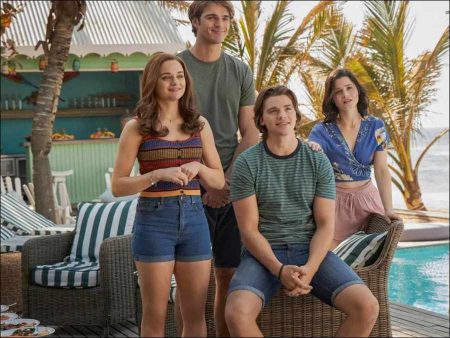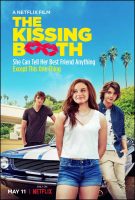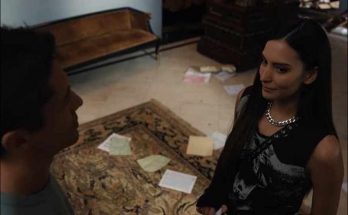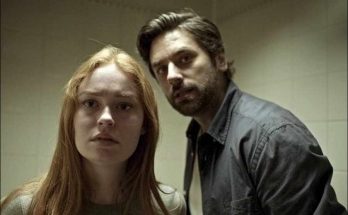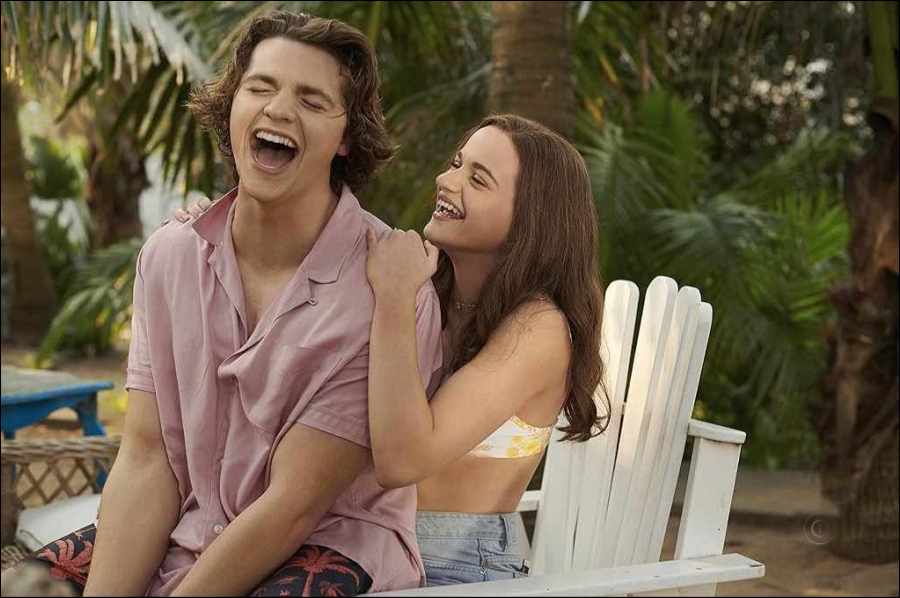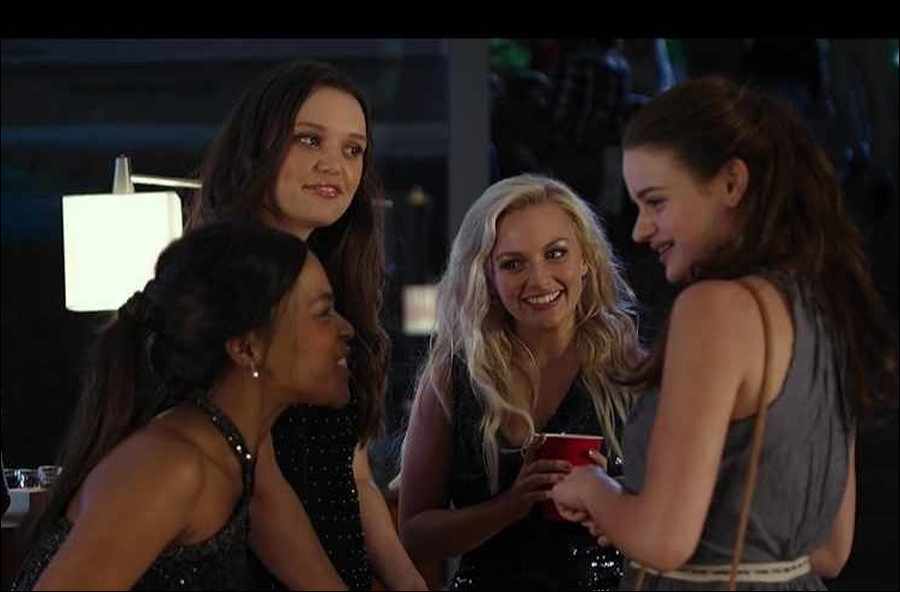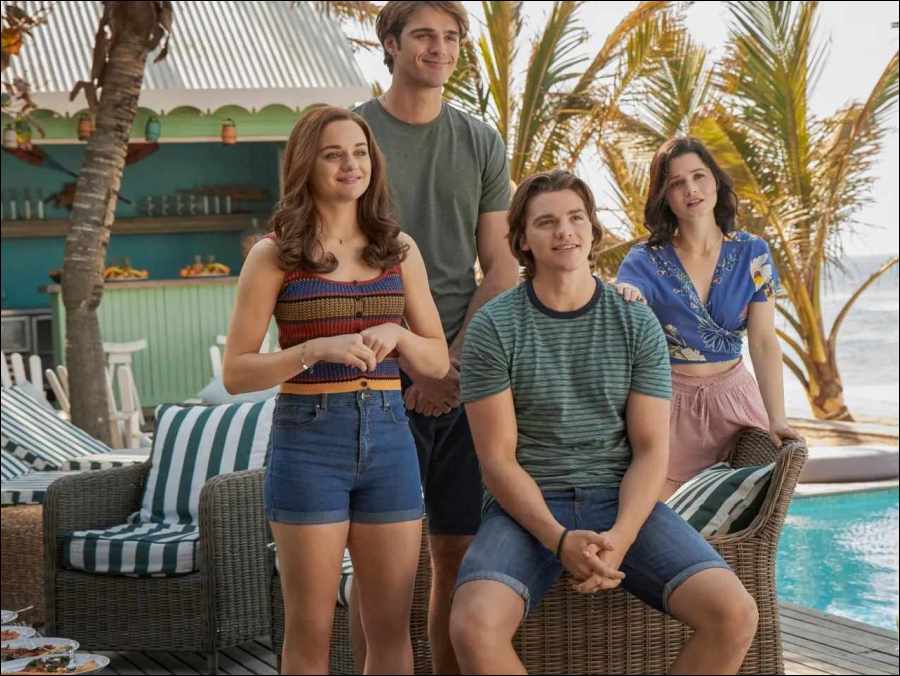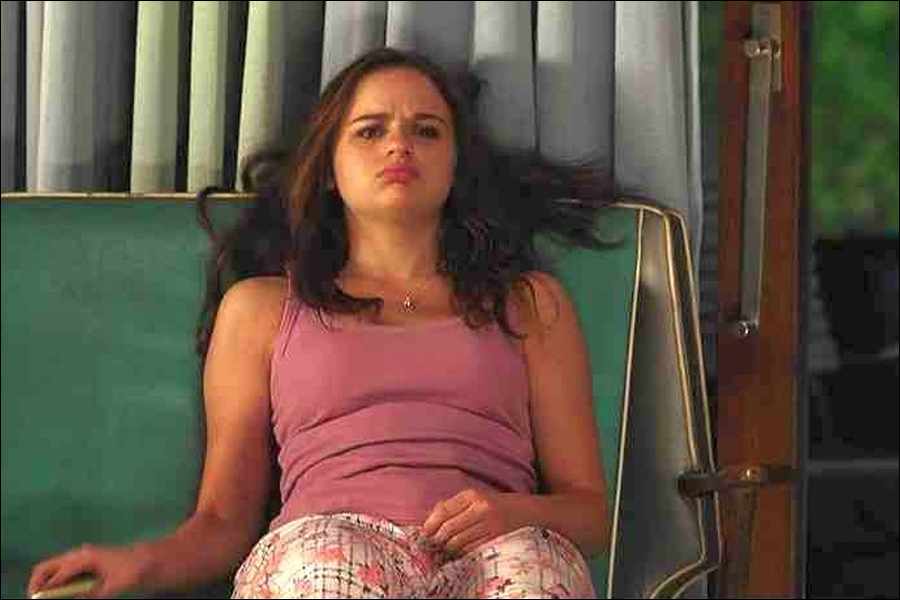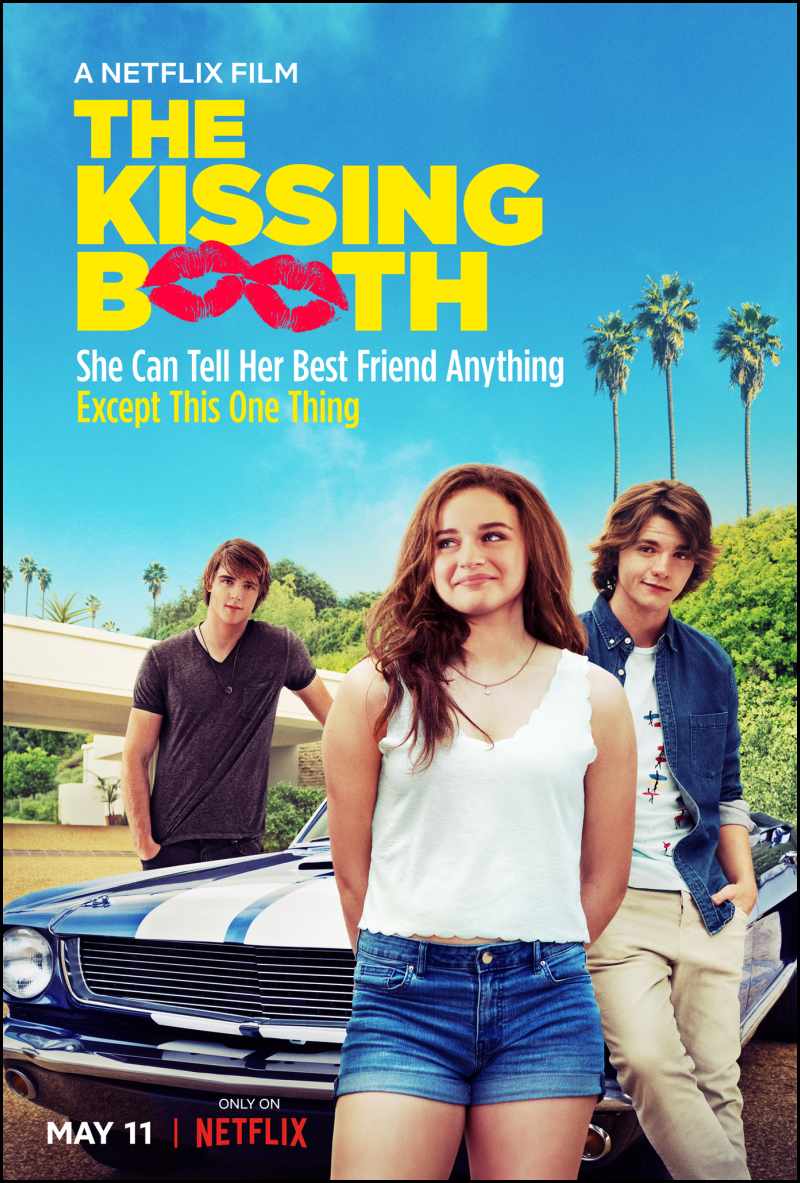Taglines: She can tell her best friend anything. Except this one thing.
The Kissing Booth movie storyline. When Elle Evans (Joey King), a pretty, late-bloomer who’s never-been-kissed, decides to run a kissing booth at her high school’s Spring Carnival, she unexpectedly finds herself locking lips with her secret crush- the ultimate bad boy, Noah Flynn (Jacob Elordi).
Sparks fly, but there’s one little problem: Noah just happens to be the brother of her best friend, Lee, (Joel Courtney) and is absolutely off limits according to the rules of their friendship pact. Elle’s life is turned upside down when she realizes that she must ultimately make a choice: follow the rules or follow her heart. Based on Beth Reekle’s self-published coming-of-age novel that became an international sensation, THE KISSING BOOTH is a Netflix Film, written and directed by Vince Marcello.
The Kissing Booth is a 2018 American teen romantic comedy film written and directed by Vince Marcello, based on the 2012 novel of the same name by Beth Reekles.[1] It stars Joey King, Jacob Elordi, and Joel Courtney. The film follows Elle (King), a quirky, late blooming teenager whose budding romance with high school senior and bad boy Noah (Elordi) puts her lifelong friendship with Noah’s younger brother Lee (Courtney) in jeopardy.
The Kissing Booth was released on Netflix on May 11, 2018, and was dubbed a commercial success by the service, due to it being widely viewed by subscribers, leading to the eventual production of a trilogy of films. The film was largely panned by critics, who deemed its storyline and themes to be clichéd. A sequel, The Kissing Booth 2, was released on July 24, 2020, and the third film, The Kissing Booth 3, was released on August 11, 2021.
Film Review for The Kissing Booth
Netflix might be trying to corner the market on big-budget spectacles from some of Hollywood’s hottest names — from the $90 million “Bright” to its multi-picture deal with Adam Sandler and Martin Scorsese’s much-hyped “The Irishman” — but the streaming giant has quietly planted its stake in a less ambitious place: romantic comedies. So far this year, Netflix has released six original films that are classified as rom-coms, with at least three more on the way before the year closes out. And it’s on to something here: 2017’s “A Christmas Prince” was such a smash hit for the outfit that it has already prepped a holiday sequel.
Netflix’s newest hit-in-the-making, “The Kissing Booth,” is kicking up similar attention. Unfortunately, the high school-set rom-com is a sexist and regressive look at relationships that highlights the worst impulses of the genre. Netflix isn’t new to the sub-genre of teen rom-coms, and it has already succeeded with other picks. Later this month, Craig Johnson’s delightful “Alex Strangelove” will arrive on the streaming service, and last month saw the introduction of Olivia Milch’s “Dude,” a female-driven comedy in the vein of other raunchy features like “Bridesmaids” and “Mean Girls.”

Films like that are indicative of the outfit locking down yet another piece of Hollywood magic and serving its viewers something they want to see, even if the traditional studio system isn’t giving it to them, but “The Kissing Booth” is a strange blight on that run. The film combines classic narrative tropes of the genre — think a low-budget mishmash of “Pretty in Pink,” “Never Been Kissed,” “Mean Girls,” and “10 Things I Hate About You” — but is also hobbled by a gross understanding of gender dynamics and what makes a healthy relationship.
And that’s to say nothing of its approach to depicting sexual harassment, frequent slut-shaming of its leading lady, and attempting to romanticize a “bad boy” love interest who mainly seems interested in getting in physical fights and then loudly mouthing off about his possessive tendencies. Cute, huh?
The movie, written and directed by Vince Marello (best known for his film versions of stories from the “American Girl” doll franchise), is an adaption of the Beth Reekles novel of the same name, and starts off with a relatively sweet premise. Elle (Joey King) and Lee (Joel Courtney) have been best friends since birth, “raised like twins” by their mothers, who also happen to be life-long best friends. (One of the moms is even played by Molly Ringwald, to give the film further rom-com bonafides.) They’ve been obsessed with Dance Dance Revolution since they were tiny, and while their private high school appears to be a clique-y kind of place, they’ve grown into popular-ish kids who are grounded by their bond.
The central conflict is a classic one of the genre: Elle falls in love with the wrong dude. This dude happens to be Lee’s older brother, Noah (Jacob Elordi), who has always been an elusive part of Elle’s life, mainly standing out because of his near-constant tendency to get into physical altercations. That’s not the problem with Noah, though — who, as a high school senior, is cast as a literally leather jacket-wearing, motorcycle-riding jock, all the better to drive home his sex appeal and “bad” reputation. Instead, the issue is that he’s Lee’s brother, and is thus off-limits to Elle.
The first act of “The Kissing Booth” plays out in predictable fashion, as Elle wrestles with her growing feelings for Noah as he alluringly teases her, engaging in the kind of push-pull will-they-won’t-they dynamic that’s always been a hallmark of the genre. And yet, even in its earliest moments, “The Kissing Booth” is preoccupied with sexist rhetoric and a willingness to apologize for Noah’s alarming behavior.
Elle (who, it must be noted, is just charming, thanks to King’s bubbly performance) has a lot going for her, including a plucky personality that manages to find all kinds of solutions for weird problems. Early in the film, Elle tears her last pair of school-issued pants, and unable to rustle up any other options, is forced to head off to school wearing a two-year-old skirt (too small, but at least part of the dress code). The moment she hits campus, she’s assaulted by catcalls from nearly all of her fellow male students (a real “boys will be boys” moment that imagines that all teenage boys are simply unable to do anything beyond scream epithets at pretty girl they’ve known for years, if she’s wearing a short piece of clothing).
It gets worse, as Elle is groped by another student, leading Noah to physically assault him (predictable). Elle lands in the principal’s office — an awkward enough twist, given she’s the actual victim here — and things only get worse from there. Both Lee (again, her best friend and typically a sweet guy) and the school’s principal tell Elle that she was “asking for it” by wearing the skirt. It’s a laughably regressive moment, such obviously outdated thinking, but “The Kissing Booth” just keeps plugging along.
The parking lot-set fisticuffs helps pave the way for Elle and Noah’s tentative romance, with Noah first brushing off his behavior as springing from a place of familial affection for Elle, while she wonders if it’s a sign that he has deeper feelings for her. Despite this run-of-the-mill and wholly relatable high school romance (who has never felt like Elle?), “The Kissing Booth” remains enamored of Noah’s defining characteristics: he’s got a seriously violent streak who gets turned on by jealousy and demonstrates some weirdo possessiveness that never abates.
This is not an exaggeration. Noah’s affection for getting into fights — often very brutal ones — becomes a large part of the film. Elle even lays down a rule that he can’t fight anymore if he wants them to be together (His response: “You know, you’re cute when you’re bossy”), and later gets him to admit that his family has struggled to deal with it, even sending him to counseling with no lasting impact. It’s “kinda just how I’m wired,” he muses, and that’s all there is. Later, Lee briefly worries that Noah has hit Elle, a jarring moment in a film marketed as a fluffy rom-com for teens. And Elle constantly acquiesces to him, even when it feels dangerous.
On occasion, Noah’s possessiveness comes out in nice ways — like when he stands up to a girl who is being mean to Elle — though even those moments are tempered by his pervasive misogynistic attitude. That girl? She “tasted like Cheetos” anyway, who cares if he was just making out with her. Later, Noah will continue to act as if he was pulled from some manual written by Men’s Rights Activists, opting to apologize to her father when he hurts Elle and even using his big romantic moment to further cut her down, pointing out that he’s going public with his love, standing in front of everyone they know, as if he should be getting points just for being seen with her in public.
Elle does attempt to assert herself on a few occasions, but even those moments feel designed to further strip of her agency and set her up as a plaything for her perpetually googly-eyed peers. When a painting project goes awry, Elle stumbles into the girls’ bathroom (or so she thinks) to clean up, taking off her shirt before she realizes she’s actually in the boys’ locker room, surrounded by horny, panting teens. And there’s Noah, screaming at her to cover up, while Elle fires back with a well-earned “You’re not the boss of me, Noah!” It could all end there, but instead, in the next moment, Elle opts to dance around provocatively, still with her shirt off.
On one hand, she’s taking control of her own sexuality and body; on the other, she’s doing it entirely to get a rise out of the guy. That’s not true agency, and it’s Noah who is still pulling the strings.
“The Kissing Booth” eventually pushes towards a conclusion that could offer Elle the chance to embrace herself instead of the overbearing Noah, sending him off to college after the pair finally profess their love for each other and manage to enjoy their final days together (fight-free, to be sure), before going back on it, obsessed with defining Elle only in relation to her boyfriend. After the pair bid a tear-soaked goodbye to each other at the airport, a confident Elle strolls outside to Noah’s motorcycle (hers now) to embark on a life that may not always include Noah. It’s a believable, satisfying moment, and an unexpected twist on the genre. Maybe Elle can be the hero of her own story for once.
And still, as Elle sets off on her own, literally riding off into the sunset by herself, she can only think of one thing: “I knew there was a part of me that was always going to belong to Noah Flynn.” In another film, the sentiment would be a romantic one. In “The Kissing Booth,” it feels like a cage.
Other Movies of Franchise
The Kissing Booth 2
The Kissing Booth 3
The Kissing Booth (2018)
Directed by: Vince Marcello
Starring: Joey King, Joel Courtney, Jacob Elordi, Meganne Young, Stephen Jennings, Chloe Williams, Carson White, Molly Ringwald, Morné Visser, Jessica Sutton, Zandile Madliwa
Screenplay by: Vince Marcello
Production Design by: Dave Arrowsmith
Cinematography by: Anastas Michos
Film Editing by: Paul Millspaugh
Costume Design by: Annamarie Seegers, Karlien Seegers
Set Decoration by: Stuart Bryce, Craig Menzies
Art Direction by: Francois Coetzee, Ilana Louw
Music by: Patrick Kirst
MPAA Rating: None.
Distributed by: Netflix
Release Date: May 11, 2018
Views: 45
